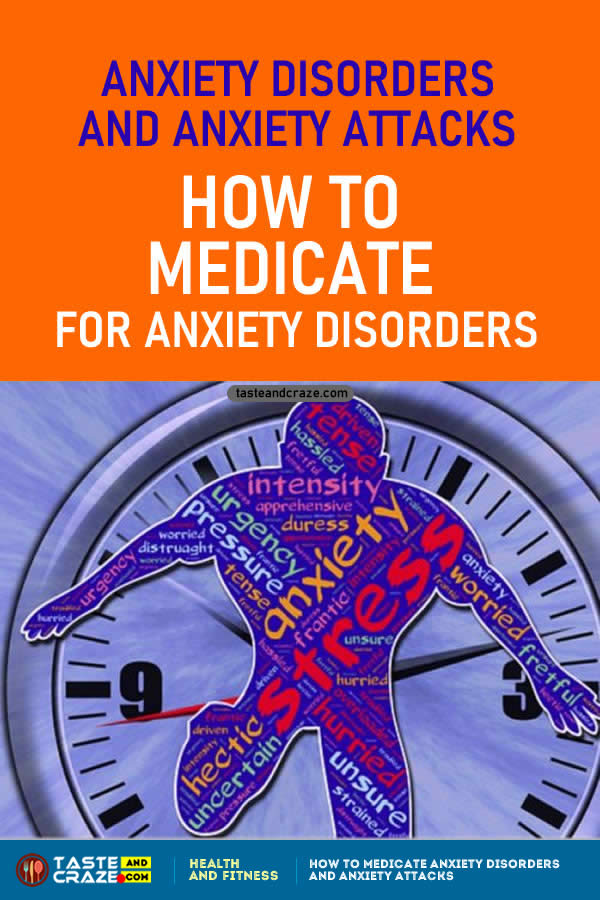ADVERTISEMENT
Do you have Anxiety Disorders and Anxiety Attacks? Well, you are not alone. Anxiety is the body’s natural response to danger, an automatic alarm that goes off when you feel threatened, under pressure, or is facing a stressful situation.
Signs and Symptoms of Anxiety Disorders
If you identify with any of the following 7 signs and symptoms, and they just won’t go away, you may be suffering from an anxiety disorder.
- Are you constantly tense, worried, or on edge?
- Does your anxiety interfere with your work, school, or family responsibilities?
- Are you plagued by fears that you know are irrational, but can’t shake?
- Do you believe that something bad will happen if certain things aren’t done a certain way?
- Do you avoid everyday situations or activities because they cause you anxiety?
- Do you experience sudden, unexpected attacks of heart-pounding panic?
- Do you feel like danger and catastrophe are around every corner?

Medication for Anxiety Disorders
If you have anxiety that’s severe enough to interfere with your ability to function, medication may help relieve your symptoms.
However, anxiety medications can be habit-forming and cause unwanted side effects, so be sure to research your options.
Medication is useful for alleviating the symptoms of generalized anxiety disorder and is often prescribed in conjunction with other therapies. Some types of anxiety drugs can be habit-forming and are usually prescribed on a short-term or as-needed basis. [source]
Different anxiety disorders have different medication regimens. Some are preventive and some are designed to cure the problem.
Drugs to Treat Anxiety Disorder
Many types of medications are available. Because every person is different, you and your doctor may have to try several medications to find the right one for you.
1. Benzodiazepines
- Alprazolam (Xanax)
- Chlordiazepoxide (Librium)
- Clonazepam (Klonopin)
- Diazepam (Valium)
- Lorazepam (Ativan)
2. Buspirone
Buspirone is used to treat both short-term anxiety and chronic (long-lasting) anxiety disorders. It’s not fully understood how buspirone works, but it’s thought to affect chemicals in the brain that regulate mood.

3. Antidepressants
Antidepressants, particularly selective serotonin reuptake inhibitors (SSRIs), are widely used to treat and prevent a variety of anxiety disorders.
3.1. SSRIs: Examples of SSRIs that are commonly used to treat chronic anxiety include:
- Citalopram (Celexa),
- Escitalopram (Lexapro),
- Fluoxetine (Prozac),
- Paroxetine (Paxil),
- Sertraline (Zoloft)
- Duloxetine (Cymbalta)
- Venlafaxine (Effexor)
3.2. Tricyclics: Tricyclics work, as well as SSRIs, do for treating most anxiety disorders, except obsessive-compulsive disorder (OCD). Examples of tricyclics used for anxiety include:
- clomipramine (Anafranil)
- imipramine (Tofranil)
3.3. MAOIs: Monoamine oxidase inhibitors (MAOIs) are used to treat panic disorder and social phobia. They work by increasing the number of neurotransmitters that regulate mood. MAOIs that are FDA-approved to treat depression but used off-label for anxiety include:
- isocarboxazid (Marplan)
- phenelzine (Nardil)
- selegiline (Emsam)
- tranylcypromine (Parnate)
4. Beta-blockers
Beta-blockers are most often used to treat heart conditions. They’re also used off-label to help relieve the physical symptoms of anxiety, especially in social anxiety disorder.
5. Home Remedies
There are a variety of at-home interventions that can help ease your anxiety symptoms. Several interventions can also be practiced in addition to taking medications. Examples of these interventions include:
5.1. Exercise: Exercise can help to reduce stress and enhance your overall sense of well-being, according to the Anxiety and Depression Association of America (ADAA).

5.2. Meditate: Taking 15 minutes of quiet time and meditation to focus on deep breathing and relaxation can help calm your anxiety. You can listen to music or repeat a motivational mantra on a regular basis. Yoga can also help relieve stress.
5.3. Chamomile: Sipping chamomile tea or taking a chamomile supplement might help to ease anxiety symptoms. A 2016 double-blind study published in the Phytomedicine journal focused on individuals with a generalized anxiety disorder.
5.4. Aromatherapy oils: Smelling diluted aromatherapy oils can help to reduce anxiety, according to an article published in the Evidence-Based Complementary and Alternative Medicine journal. Examples of essential oils used to provide anxiety relief include:
- lavender
- neroli
- chamomile
5.5. Avoid caffeine: Sometimes caffeine can make a person feel jittery and more anxious. Avoiding it can help some people reduce their anxiety.
Finally, Talk to your doctor
Your doctor can help you find the best course of treatment for your anxiety disorder. Proper treatment will likely include psychotherapy and medication.




